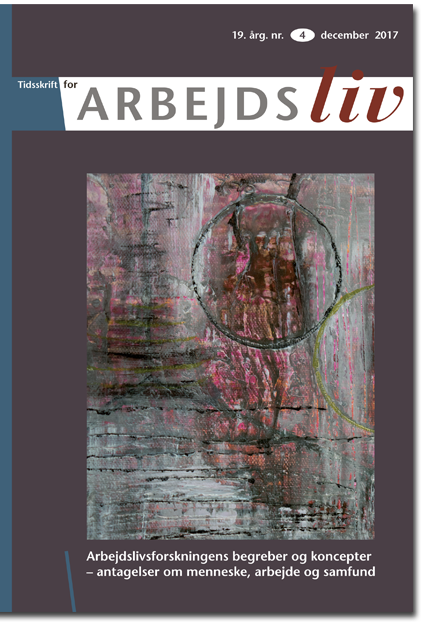Work and learner identity
Et bud på en kvalitativ analysemodel
DOI:
https://doi.org/10.7146/tfa.v19i4.109052Abstract
This articler outlines how Archer’s Critical Realist approach and concepts of personal identity, natural, practical and social concerns (Archer, 2000, 2003) and Salling-Olesen’s Life-historical approach rooted in Critical Theory (2002, 2007) conceptualise the relation between work and identity. The life historical approaches sug - gest that identity is continuously formed, maintained or transformed in experience processes mediated by peoples’ immediate experiences, their life historical experiences and objectified experience/ cultural knowledge . Archer’s concepts of a fragmented reality and natural, performative and social engagement in the world emphasize that engagement always affords both natural, performative and social concerns influencing the formation of identity. The article points at how Archer’s and Salling Olesen’s concepts can contribute to a theoretical framework, enabling researchers to examine how peoples orientations, especially their learner identities, are formed through on-going engagement in specific work lives. Such a framework is crucial in order to grasp how different groups have distinctive conditions for forming a proactive learner identity and engage in formal learning, and thus for meeting the obligations prevalent in both national a transnational policies on lifelong learning. The framework was developed as part of an empirical study aiming to understand how people working unskilled jobs perceive the meaning of adult education and training, and how their per - ceptions are conditioned by their work life experiences. Consideration of the differentiated nature of human engagement illustrates that the content and organization of work plays a significant role when people form, maintain and transform their learner identity. Task variations, physical strain and risk of degeneration, work procedures, speed and noise, degree of opportunities for creative problem solving, autonomy, career patters, training and recruitment programs, etc. condition how people perceive their need and opportunity to engage in different kinds of learning activities in relation to their work situation. The application of the dialectic concept of learner identity outlined in the article enables researchers to examine how peoples’ perceptions of needs and opportunities to participate in job related adult education and training are formed by their individual life historical experiences and by the bodily, performative and social concerns they have in relation to their current and future work life. Focusing on work life experiences and concerns can thus reveal how different kinds of work form the specific conditions for the development, maintenance or transformation of learner identities and for the opportunities of positioning oneself as an educable subject.
Downloads
Published
How to Cite
Issue
Section
License
Forfattere, der publicerer deres værker via dette tidsskrift, accepterer følgende vilkår:
- Forfattere bevarer deres ophavsret og giver tidsskriftet ret til første publicering, samtidigt med at værket ét år efter publiceringen er omfattet af en Creative Commons Attribution-licens, der giver andre ret til at dele værket med en anerkendelse af værkets forfatter og første publicering i nærværende tidsskrift.
- Forfattere kan indgå flere separate kontraktlige aftaler om ikke-eksklusiv distribution af tidsskriftets publicerede version af værket (f.eks. sende det til et institutionslager eller udgive det i en bog), med en anerkendelse af værkets første publicering i nærværende tidsskrift.
- Forfattere har ret til og opfordres til at publicere deres værker online (f.eks. i institutionslagre eller på deres websted) forud for og under manuskriptprocessen, da dette kan føre til produktive udvekslinger, samt tidligere og større citater fra publicerede værker (se The Effect of Open Access).





